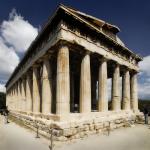|
This section contains 288 words (approx. 1 page at 300 words per page) |

|
Hesiod. Didactic poetry (from the Greek word didasko or "teach") was always written in the same meter as epic (dactylic hexameter) and therefore not distinguished by the ancients from that grander genre. Nevertheless, the modern classification is well-established and convenient. There survives only one complete didactic poem from the period covered in this chapter, Hesiod's Works and Days (circa eighth century B.C.E.), and it was this poem which was to have great influence when a more scientific age revived the practice of didactic verse; there survive several such works from the Hellenistic (for example, Aratus) and Roman periods (especially Lucretius and Vergil).
Moral Fervor. Addressed to his brother Perses, Hesiod's poem is less concerned with the technicalities of its predominant subject matter, agriculture, than with questions of correct behavior and justice, in which it seems that his brother was rather deficient. This...
|
This section contains 288 words (approx. 1 page at 300 words per page) |

|




